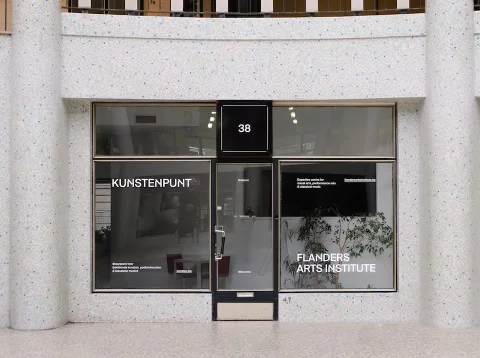
Landscape Sketch of the Arts: session cross-sectoral arts
Give your opinion and contribute to the Landscape Sketch of the Arts!
The Landscape Sketch of the Arts is a comprehensive analysis of Flanders' professional arts landscape that Flanders Arts Institute puts together at the start of each new political term. To make sure nothing is overlooked, we organise several sessions throughout 2024 to gather input from the sector, each time focusing on a different part of the arts field.
-> Read more about the Landscape Sketch of the Arts here.
Session cross-sectoral arts
The activities of artists and arts organisations are not limited to our own field: there is a lot of collaboration today across different sectors. These so-called cross-sectoral practices offer opportunities in terms of sustainability, innovation and participation. Moreover, recognition for this way of working is increasing: in the new Arts Decree, cross-sectoral work is a separate (sub)discipline for the first time, and there is also a clear incentive policy at other policy levels. However, linked to these opportunities are also several challenges and issues.
We invite professionals to reflect on these with us using six themes.
Themes
Take a look at the full program and content of the discussion tables here.
1. Cross-sectoral: what and why?
What is the added value of cross-sectoral work, and what does it add to the arts field and wider society?
2. Is that art?
What about the recognition of cross-sectoral work in the wider arts field?
3. Processes versus products
A lot of cross-sectoral practices put processes at the centre, and do not necessarily culminate in a product. While that may be a conscious choice, it also makes things complex.
4. Entrepreneurship and working internationally
Governments at different policy levels encourage cross-sectoral interactions between arts and other domains, often from the agenda of additional funding and entrepreneurship. But to what extent is this justified or desirable?
5. Public
Where sectors interact, their audiences often do too. But how evident is cross-sectoral work to traditional art audiences, and how do you engage the segments outside of them?
6. Collaboration
The common denominator of cross-sectoral art is collaboration with other domains. But who do you partner with, who takes the first step and how do you go about it? Are all sectors equally enthusiastic about collaborating with artists?
When and where
September 2, at 10:00 in Timelab (Kogelstraat 34, 9000 Ghent).
Register
Would you like to participate? You can register via the button at the top right.
To register, we ask you to create an account on our website and choose a password (at the ‘Sign up’ button). With your own account, you can always update your details and/or unsubscribe from the event. If you want to register for another event, you obviously do not need to create it again. Having problems creating an acccount? Then send an e-mail to sofia@kunsten.be.
Remuneration, barriers and confidentiality
Flanders Arts Institute wants creators' voices to be heard more. For freelance artists (who are not on the payroll of an arts organisation and for whom participation is therefore unpaid) Flanders Arts Institute provides a volunteer fee. You can indicate this in the practical confirmation email.
Furthermore, we want to help address any barriers for participants, e.g. through hybrid participation for people who have difficulty getting physically on site, food preferences or childcare. Please let us know how we can accommodate you via that same confirmation email.
To enable a safe conversation, Flanders Arts Institute commits to keeping identifiable statements within the conversation and to anonymously incorporate these insights into the final report.
Questions?
Do you have a question about this session? Contact our colleague Jannis via jannis@kunsten.be.
